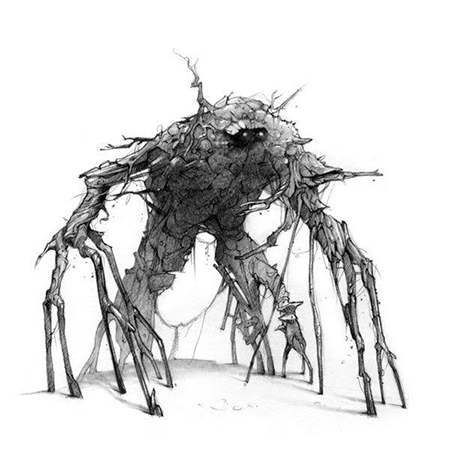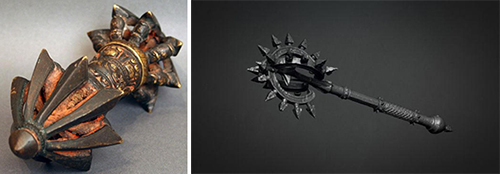 |
“목적한 인간을 손에 넣기 위해서는 집단을 이루어 모든 곳을 샅샅이 뒤지며...” 이라크 지역에 서식하는 어떤 악마집단에 대한 설명이다. 이 압색 악마들은 인간세상에 출몰하여 사람들을 지하세계로 잡아가는 사냥꾼들이다.
사람들이여, 악마들의 좌표에 찍히지 말라. 사냥꾼들의 압색작전에 걸리면 피할 수도, 숨을 수도 없다.
악마들의 좌표에 찍히면 어떻게 되나. 삶은 악몽이 될 것이다. 삶은 공포가 될 것이다. 맙소사, 놈들은 아이들에게도 무자비하다.
놈들은 허벅지에 무기를 장착하고 돌아다닌다. 사람 머리를 싹둑싹둑 자르는 무기다.
그러나 악마들을 잡는 방법이 있다. 철퇴로 놈들을 깨부술 수 있다.
 |
| ▶놈들은 고문도 한다. (A depiction taken from an ancient Sumerian language cylinder seal showing the god Dumuzid being tortured in the Underworld by gallas.) |
(부록)
압색 악마들
Gallas. “목적한 인간을 손에 넣기 위해서는 집단을 이루어 모든 곳을 샅샅이 뒤지”는 악마들.(환상동물사전, 구사노 다쿠미, 송현아) 지상-지하의 두 세계를 오가며 악을 행한다. 사람에게 악몽과 공포의 삶을 선물한다. 아이들을 유괴하고 죽인다. ‘인간의 적’을 총칭하는 말이기도 하다. 지하세계의 여왕 에레키시갈을 모신다. Gallu demons were dark and wicked beings from the underworld. They were unusual in their ability to travel between the normal world and underworld, and could carry people off into eternal darkness. They caused nightmares, making people flee in terror and so on. They hauled unfortunate victims off to the underworld. The demons or devils of the ancient Mesopotamian Underworld.
희생양을 찾아야 악을 멈춘다
또한 사람의 살을 먹고 피를 마신다. They could be held back or appeased by sacrificing animals to them, as they were known to prey on herds as well as people. The gallu was known to drink blood and eat human flesh.
놈들의 무기
악마들은 허벅지에 사람 머리를 자르는 무기를 장착하고 돌아다닌다.
 |
| ▶철퇴 맞아 죽은 놈 |
출생의 비밀
악마(남성)와 인간(여성) 사이에서 태어난 악의 씨앗들. Sometimes they were seen as the offspring of devils and human women.
생김새
The gallu was generally humanoid in appearance, occasionally animal-headed (often that of a bull). 그러나 정확한 모습을 아는 사람은 없다.
서식지
오늘날의 이라크 일대. In Sumerian and ancient Mesopotamian religion. In Babylonian and Assyrian mythology.
놈들을 무찌르려면
철퇴! An especially fierce gallu demon, the monstrous was slain by Ninurta using the enchanted mace Sharur. ㅁAsag=악마들 중에서도 특히 사나운 놈이었다. In the Sumerian mythological poem Lugal-e, Asag or Azag, is a monstrous demon, so hideous that his presence alone makes fish boil alive in the rivers. ㅁNinurta=an ancient Mesopotamian god associated with farming, healing, hunting, law, scribes, and war who was first worshipped in early Sumer. 혹은 Ninĝirsu.
 |
| ▶이걸로 부숴버려! |
(삼화학습)
이름
gallûs, gallas, gallû, gal.lu. (여성형=갈라) ghoul = ghul = gallu. It seems that these gallu demons are the original source of the ghul, both in etymology and some of their habits. The most likely reason for this is that the tribes of Arabia and surrounding lands had trade links with Mesopotamia (present-day Iraq and its neighbours). Through these links, they absorbed and spread the idea of the gallu, which became the ghul.
 |
‘7 악귀들’ 중의 하나
일명 ‘지옥의 새끼들’. They were one of seven devils (or "the offspring of hell") of Babylonian theology that could be appeased by the sacrifice of a lamb at their altars. There are certain spirits described as “the Seven” around whom a great many poems were composed and welded into the incantations and spells. The best known is the Invocation against the Seven: —
Seven are they! Seven are they!
In the Ocean Deep seven are they!
Battening in Heaven seven are they,
Bred In the depths of Ocean.
Nor male nor female are they,
But are as the roaming windblast,
No wife have they, no son can they beget;
Knowing neither mercy nor pity,
They hearken not to prayer or supplication.
They are as horses reared among the hills…
Of these seven [the first] is the South Wind.
The second Is a dragon with mouth agape
That none can [withstand];
The third is a grim leopard
That carrieth off children…
The fourth is a terrible serpent…
The fifth is a furious beast [?]
After which no restraint…
The sixth is a rampant […]
Which against god and king.
The seventh is an evil windstorm…
These seven are the Messengers of Anu, the king:
Bearing gloom from city to city,
Tempests that furiously scour the heavens,
Dense clouds that over the sky bring gloom,
Rushing windgusts, casting darkness o’er the brightest day,
Forcing their way with baneful windstorms.
Mighty destroyers, the deluge of the Storm-God,
Stalking at the right hand of the Storm-God.
관리자 freemediaf@gmail.com
<저작권자 © 자유언론실천재단, 무단 전재 및 재배포 금지>

